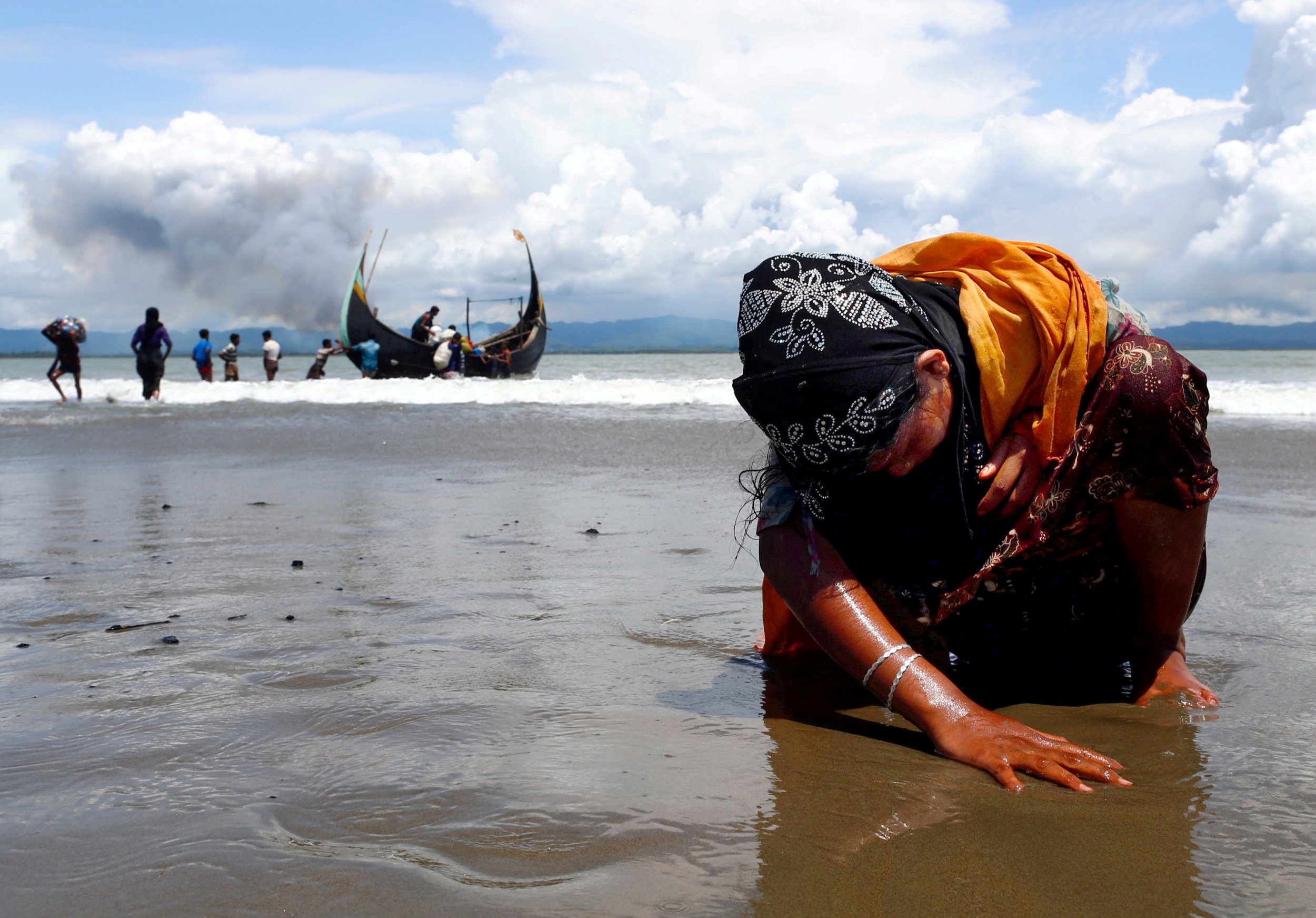
Updated | Myanmar's army has admitted responsibility for the killing of 10 Rohingya people found in a mass grave in the country's Rakhine state in December, but it did not identify the victims as civilians.
A post published on the army chief's Facebook page said the Rohingya found in the mass grave were "terrorists" killed in retaliation for threatening Buddhist villagers.
"It is true that both the villagers and security forces admitted they killed the 10 Bengali terrorists," read the military statement quoted in the Associated Press. "The army will take charge of those who are responsible for the killings and who broke the rules of engagement. This incident happened because ethnic Buddhist villagers were threatened and provoked by the terrorists."
The country's military has not publicly admitted to the killing of members of the stateless Muslim minority that has driven hundreds of thousands of Rohingya to seek refuge in Bangladesh in the past five months, after a Rohingya militant group attacked Myanmar's security forces on August 25 and the authorities retaliated on the civilian population.
The military claims to be fighting against Bengali insurgents, as Myanmar does not recognize the Rohingya's status as an indigenous ethnic minority—they were stripped of nationality in 1982 and are accused of illegally migrating to Myanmar from Bangladesh.
The U.N. has called the violence perpetrated against the Rohingya minority a "textbook example of ethnic cleansing," a definition the U.S. has recently adopted after Secretary of State Rex Tillerson's visit to Myanmar in November.
"There are a number of international actors who privately communicated to senior Myanmar officials that their outright denials of any wrongdoing are, in not so many words, ludicrous," human rights organization Fortify Rights CEO and co-founder Matthew Smith tells Newsweek, adding that he hopes the international community would keep pressuring Myanmar's authorities to hold all perpetrators accountable.
"At this point, that's the international community's job. The Myanmar government has already demonstrated it won't or can't hold perpetrators accountable," he says.
Amnesty International's regional director for Southeast Asia and the Pacific James Gomex agrees there needs to be an independent investigation into the violence in the Rakhine state. "This grisly admission is a sharp departure from the army's policy of blanket denial of any wrongdoing. However, it is only the tip of the iceberg and warrants serious independent investigation into what other atrocities were committed amid the ethnic cleansing campaign," he says in a statement emailed to Newsweek.
"The full extent of the violations and crimes against the Rohingya and other ethnic minorities will not be known until the UN Fact-Finding Mission and other independent observers are given unfettered access to Myanmar," he adds.
The mass grave was discovered in December in the Inn Din village near Maungdaw, one of the areas in the Rakhine state worst affected by the violence, the area of investigation of two Reuters journalists who were arrested earlier that month.
Myanmar's army announced it appointed a senior general to lead a probe into the killings and promised to hold security forces accountable if found to be involved, but recent developments signal there is yet to be a major breakthrough in holding perpetrators accountable, Smith says.

Myanmar prosecutors are instead seeking to charge the two journalists, Wa Lone and Kyaw Soe Oo, under a colonial-era law known as the Official Secrets Act, that carries a maximum jail sentence of 14 years.
"They arrested us and took action against us because we were trying to reveal the truth," Wa Lone said on Wednesday, quoted in Reuters, after the first hearing of the trial. The U.S., the U.N., the EU and several other international organizations and officials have called for the journalists' release.
"A free press is critical to a free society—the detention of journalists anywhere is unacceptable. The Reuters journalists being held in Myanmar should be released immediately," former President Bill Clinton tweeted on Monday.
The State Department called Myanmar's decision to prosecute the reporters as "deeply disappointing" and called for their "immediate and unconditional" release.
"The United States is deeply disappointed by today's court decision in Burma to allow prosecution of Reuters reporters Wa Lone and Kyaw Soe Oo under the Official Secrets Act. The media freedom that is so critical to rule of law and a strong democracy requires that journalists be able to do their jobs. We reiterate our call for Wa Lone and Kyaw Soe Oo's immediate and unconditional release," the statement read.
This article was updated to include statements from Amnesty International and the State Department received after publication.
Uncommon Knowledge
Newsweek is committed to challenging conventional wisdom and finding connections in the search for common ground.
Newsweek is committed to challenging conventional wisdom and finding connections in the search for common ground.
About the writer
Sofia Lotto Persio reports mainly on Asia and gender issues for Newsweek. She previously covered international affairs with a specific ... Read more





